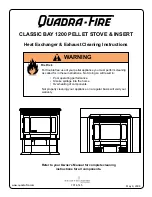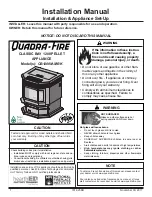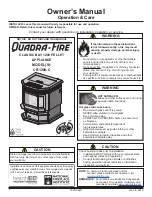
10
Encore
®
1450CE Non-Catalytic Woodburning Stove
30003845
keep the Stove a Safe distance
from Surrounding materials
Both a stove and its chimney connector radiate heat in
all directions when operating, and dangerous overheat-
ing of nearby combustible materials can occur if they
are too close to the heat. A safe installation requires
that adequate clearance be maintained between the
hot stove and its connector and nearby combustibles.
Clearance is the distance between either your stove
(measured from the bottom edge of the stove’s top
plate) or chimney connector, and nearby walls, floors,
the ceiling, and any other fixed combustible surface.
Your stove has special clearance requirements that
have been established after careful research and test-
ing to both US and European standards. These clear-
ance requirements must be strictly observed.
In addition, furnishings and other combustible materi-
als must be kept away from the stove. In general, a
distance of 119 mm (48”) must be maintained between
the stove and moveable combustible items such as dry-
ing clothes, furniture, newspapers, firewood, etc. Keep-
ing those clearance areas empty assures that nearby
surfaces and objects will not overheat.
clearances
as with any solid fuel heating stove, extremely high
surface temperatures can occur, particularly in the
event of uncontrolled operation, e.g. if the doors
are inadvertently left open. it is crucial that suf-
ficient clearances are allowed to any combustible
surfaces, e.g. wooden mantels or lintels, and to
timber framed (studded) walls even if they are faced
with noncombustible board. detailed information
on fireplace and hearth construction is provided
in section 2 of document j, all installations must
comply with these requirements or with the relevant
National or local building standards.
Clearances to timber framed (studded) walls are in-
cluded below. There are no specific minimum clearanc-
es to solid noncombustible surfaces (e.g. the sides and
rear of Inglenook fire openings constructed from solid
masonry) other than to allow safe access to the controls
of the stove. For this reason minimum side clearances
of 15 mm, and a minimum rear clearance of 50 mm
are recommended.
ST486a
Defiant EU
Clearance
Diagrams
10/06
A
B
ST486a
fig. 12
Minimum clearances.
Summary of clearances
minimum recommended side clearances to non-
combustible surfaces 125 mm (5”).
minimum recommended rear clearance to noncom-
bustible surfaces 50 mm (2”).
Note:
The minimum thickness of solid noncombus-
tible materials is specified in section of Document ‘J’,
in relation to the clearance of the appliance from the
surface. As a general rule, the thickness of solid non-
combustible material forming the recess of a fireplace is
a minimum of 00 mm.
minimum rear clearance from combustible walls
(e.g. timber framed or studded walls) 750 mm (29
Z\x
”)
measured from the rear edge of the stove top. (fig.
12, b)
minimum side clearance from combustible walls
550 mm (21
B\,
”) measured from the side edge of the
stove top. (fig. 12, a)
minimum distance from stove to movable combus-
tible materials (e.g. furniture, drying clothes, etc.)
1220 mm (48”).











































